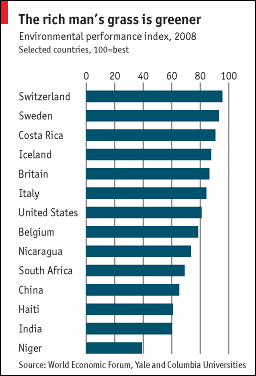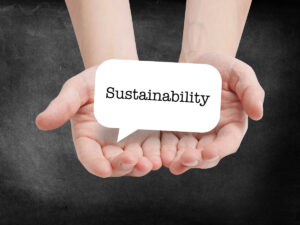There has been an empirical argument around for years that developing countries are little concerned with the environment until they reach a certain level of per capita GDP (somewhere, as I recall, around $4K to $6K). At that point, the argument goes, people are living well enough that smelly air, and dirty water, and polluted ground become important because survival is no longer that nation’s controlling motivation. Citizens start pressuring their governments to clean up the environment and start passing regulations that stop the polluters. Up to that point, however, the argument has been that poor countries can’t afford to “be green.” The Economist addressed this question in a recent article [“How green is their growth,” 26 January 2008 print edition].
“Can poor countries afford to be green? That is a question which politicians in the developing world have often asked rather pointedly. To them, it seems that the obsession of some rich types with preserving forests and saving cuddly animals like pandas or lemurs, while paying less attention to the human beings living nearby, is both cynical and hypocritical. There is, of course, plenty of evidence that greenery and growth are not polar opposites. After decades of expansion in China and other fast-emerging economies, some of the negative side-effects and their impact on human welfare, above all the death toll caused by foul air and water, are horribly clear. Yet the relationship between growth and the state of the environment is far from simple.”
It’s not that the governments of developing countries are incapable of seeing how they are mortgaging their country’s future to pollution. They just don’t seem to care. They would rather line their pockets with cash and move away from the pollution than deal with it.
“Some new light has been cast by a team of researchers led by Daniel Esty of Yale University, who delivered their conclusions … to the World Economic Forum in Davos, Switzerland. What they presented was the latest annual Environmental Sustainability Index, which grades the ‘environmental health’ of 150 countries—using many indicators, from population stress and eco-system health to social and institutional capacity. This year’s report focuses on the link between the state of the environment and human health. In a nutshell, what the new report (also sponsored by the European Commission and Columbia University) suggests is that poor countries have been quite right to challenge the sort of green orthodoxy which rejects the very idea of economic growth. Indeed, the single biggest variable in determining a country’s ranking is income per head. But that doesn’t imply that economic growth automatically leads to an improvement in the environment. The team’s finding is that growth does offer solutions to the sorts of environmental woes (local air pollution, for example) that directly kill humans.”
In other words, there is some truth to the historical notion that the environment does come on to the developing world’s agenda as its per capita GDP rises. Environmentalists should be working as hard to improve the economic well-being of humans as they are working to improve the environment. Breaking the poverty/poor environmental cycle is difficult but important the article notes.
“This matters, because about a quarter of all deaths in the world have some link to environmental factors. Most of the victims are poor people who are already vulnerable because of bad living conditions, lack of access to medicine, and malnutrition. Among the killers (especially of children) in which the environment plays a role are diarrhoea, respiratory infections and malaria. These diseases reinforce a vicious circle of poverty and hopelessness by depressing production. According to the World Bank, the economic burden on society caused by bad environmental health amounts to between 2% and 5% of GDP.”
It would be foolish to argue that environmentalists are against cleaning up the environment to help humans, but they would also counter that focusing only on improving the environment for people is too narrow a focus.
“Mr Esty’s analysis suggests that as poor countries get richer, they usually invest heavily in environmental improvements, such as cleaning up water supplies and improving sanitation, that boost human health. (Their economies may also shift gear, from making steel or chemicals to turning out computer chips.) But the link between growth and environmentally benign outcomes is much less clear, the study suggests, when it comes to the sort of pollution that fouls up nature (such as acid rain, which poisons lakes and forests) as opposed to directly killing human beings. The key to addressing that sort of pollution, Mr Esty argues, is not just money but good governance.”
It should come as no surprise that any factor dealing with development (including improving the environment) requires good governance. There are too many challenges that the governments of developing nations must face for them to squander precious resources by siphoning them off through corruption, malfeasance, and incompetence. The attached image (click to enlarge) that accompanied the Economist article shows that pristine Switzerland does much better on the Environment Performance Index than Niger — no big surprise. But according to the article there are some surprises.
“A closer look at the rankings makes this relationship clearer. Of course it is no surprise that Switzerland fares better than Niger. But why is the poor Dominican Republic much healthier and greener than nearby Haiti? Or Costa Rica so far ahead of Nicaragua, whose nature and resources are broadly similar? And why is wealthy Belgium the sick man of western Europe, with an environmental record worse than that of many developing countries? A mixture of factors related to good government—accurate data, transparent administration, lack of corruption, checks and balances—all show a clear statistical relationship with environmental performance. Among countries of comparable income, Mr Esty concludes, tough regulations and above all, enforcement are the key factors in keeping things green.”

Anyone who has ever looked at how crime-ridden areas have been successfully cleaned up understands that enforcement, not just laws on the books, matters. The same is true in any regulated sector like pharmaceuticals, toys, food, and the environment. When enforcement is lacking, problems begin to surface as companies attempt to cut corners or simply get lax in their operations. The Economist goes on to point out that the pollution affecting the environment (as opposed to pollution affecting people directly) could, in the long run, be of even greater concern.
“All this may be a helpful way of looking at pollution in the classic sense, but there is another factor that may upset all previous calculations about the relationship between growth and the state of the earth: climate change. Greenhouse emissions do not poison people, or lakes or woods, in the direct or obvious way that noxious chemicals do. But at least in the medium term, they clearly alter the earth in ways that harm the welfare of the poor. Paul Epstein of the Harvard Medical School says the impact both on nature and directly on humanity of global warming will swamp all other environmental factors. As alterations in the climate lead to mass migrations, epidemics will spread; as temperate zones warm up, tropical diseases like malaria will surge; storms will overwhelm sewer systems; heat waves will push ozone levels up.”
The Economist concludes with a recommendation that many others have made — invest in developing countries so that they can leapfrog dirty technologies and avoid the environmental costs generally associated with development.
“Here too economic growth, coupled with good governance, may yet prove to be a source of solutions rather than problems. At the moment, perhaps 2 billion people have no formal access to modern energy — they make do with cow dung, agricultural residue and other solid fuels which are far from healthy. Unless foresight and intelligence are applied to the satisfaction of these people’s needs, they may embrace the filthiest and most carbon-emitting forms of fossil-fuel energy as soon as they get the chance. A mixture of economic growth and transparent governance may offer the only chance of avoiding that disaster. Indeed, everyone will gain if poor countries find a way to leapfrog over the phases of development which in so many other places did terrible harm to the environment.”
I’m certainly not going to argue with that prescription. Implementing the best solutions possible in emerging market countries is the philosophy behind Development-in-a-Box™. When Enterra Solutions® looks around for the solutions to challenges, it looks for the best not the cheapest courses of action. Our reasons are practical. If we are going to forge long-term relationships with the countries in which we do business or hope to gain additional business, it is going to be because we earned them by doing the right thing. Shoddy work, corruption, and incompetence can never lead to sustainable development or long-term paths out of poverty.




